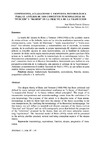Identificador persistente para citar o vincular este elemento:
https://accedacris.ulpgc.es/jspui/handle/10553/58994
| Campo DC | Valor | idioma |
|---|---|---|
| dc.contributor.author | García Álvarez, Ana María | en_US |
| dc.date.accessioned | 2019-12-17T15:18:00Z | - |
| dc.date.available | 2019-12-17T15:18:00Z | - |
| dc.date.issued | 2006 | en_US |
| dc.identifier.issn | 1130-5509 | en_US |
| dc.identifier.other | Dialnet | - |
| dc.identifier.other | WoS | - |
| dc.identifier.uri | https://accedacris.ulpgc.es/handle/10553/58994 | - |
| dc.description.abstract | La teoría del skopos de Reiss y Vermeer (1984;1996) no ha quedado exenta de ciertas críticas: se ha definido, tanto en los círculos académicos nacionales como internacionales, como "teoría del libertinaje", "teoría maquiavelista" o "teoría poco ética". Sus infinitas interpretaciones y malentendidos son el resultado, en nuestra opinión, de la confusión que suscita su propia terminología. El objetivo del presente artículo es describir algunos de estos malentendidos, con la finalidad de esclarecer la esencia de dicha teoría según nuestra propia interpretación, puesto que hace falta aclarar en la medida de lo posible la terminología de su metalenguaje teórico. Reflexionaremos principalmente acerca de los confusos conceptos de "función" y "skopos", conceptos claves en el discurso funcionalista, demostrando que, incluso en esta perspectiva relativista de la traducción, aún persiste el coletazo de la "equivalencia". Asimismo presentaremos el modelo funcional de Hulst (1995), ya que aclara en gran medida dichos conceptos teórico-funcionalistas. | en_US |
| dc.description.abstract | The skopos theory of Reiss and Vermeer (1984;1996) has been criticized and defined by many national and intemational academics as "a theory of libertinism", "a maquiavelist theory" or "a theory without ethical principies". The origin of íts innumerable interpretations and misunderstandings comes from the confusion of its own terminology. The purpose of this article is to describe sorne of these misunderstandings in order to throw light onto the essence of the theory according to our own interpretation, by clarifying the terminology of its theoretical metalanguage. For this reason, we will reflect on essential and obscure concepts of the theory such as "function" and "skopos" and we wíll consequently prove that behind the perspective of the "relativism" proposed by the theory, there are still sorne principies concerning "equivalence". The functional model of Hulst (1995), which will be presented in the artiele, clarifies precisely severa! confusing conceptual aspects of the skopos theory. | en_US |
| dc.language | spa | en_US |
| dc.relation.ispartof | Sendebar | en_US |
| dc.source | Sendebar: Revista de la Facultad de Traducción e Interpretación [ISSN 1130-5509], n. 17, p. 187-218, (2006) | en_US |
| dc.subject | 58 Pedagogía | en_US |
| dc.subject.other | Traductología funcionalista | en_US |
| dc.subject.other | Equivalencia | en_US |
| dc.subject.other | Función | en_US |
| dc.subject.other | Escopo | en_US |
| dc.subject.other | Pragmática aplicada a la traducción | en_US |
| dc.subject.other | Translatology | en_US |
| dc.subject.other | Equivalence | en_US |
| dc.subject.other | Function | en_US |
| dc.subject.other | Skopos | en_US |
| dc.subject.other | Pragmatics of translation | en_US |
| dc.title | Confusiones, aclaraciones y propuesta metodológica para el análisis de los conceptos funcionalista de "función" y "skopos" en la práctica de la traducción | en_US |
| dc.title.alternative | Confusions, Clarifications and Methodological Proposal for the analysis of "Functional" and "Skopos" functionalist concepts in the practice of translation | en_US |
| dc.type | info:eu-repo/semantics/article | en_US |
| dc.type | Article | en_US |
| dc.identifier.isi | 000209940400011 | - |
| dc.identifier.url | http://dialnet.unirioja.es/servlet/articulo?codigo=6428958 | - |
| dc.identifier.eissn | 2340-2415 | - |
| dc.description.lastpage | 218 | en_US |
| dc.identifier.issue | 17 | - |
| dc.description.firstpage | 187 | en_US |
| dc.investigacion | Ciencias Sociales y Jurídicas | en_US |
| dc.type2 | Artículo | en_US |
| dc.contributor.daisngid | 2875571 | - |
| dc.contributor.authordialnetid | 1011946 | - |
| dc.identifier.dialnet | 6428958ARTREV | - |
| dc.description.numberofpages | 32 | en_US |
| dc.utils.revision | Sí | en_US |
| dc.contributor.wosstandard | WOS:Alvarez, AMG | - |
| dc.date.coverdate | 2006 | en_US |
| dc.identifier.ulpgc | Sí | en_US |
| dc.contributor.buulpgc | BU-HUM | en_US |
| dc.description.sellofecyt | Sello FECYT | |
| dc.description.esci | ESCI | |
| dc.description.erihplus | ERIH PLUS | |
| item.fulltext | Con texto completo | - |
| item.grantfulltext | open | - |
| crisitem.author.dept | GIR Lingüística aplicada a la docencia de la lengua extranjera, su literatura y traducción | - |
| crisitem.author.dept | Departamento de Filología Moderna, Traducción e Interpretación | - |
| crisitem.author.orcid | 0000-0001-9538-9626 | - |
| crisitem.author.parentorg | Departamento de Filología Moderna, Traducción e Interpretación | - |
| crisitem.author.fullName | García Álvarez, Ana María | - |
| Colección: | Artículos | |
Citas de WEB OF SCIENCETM
Citations
1
actualizado el 25-feb-2024
Visitas 1
472
actualizado el 11-ene-2026
Descargas
798
actualizado el 11-ene-2026
Google ScholarTM
Verifica
Comparte
Exporta metadatos
Los elementos en ULPGC accedaCRIS están protegidos por derechos de autor con todos los derechos reservados, a menos que se indique lo contrario.
